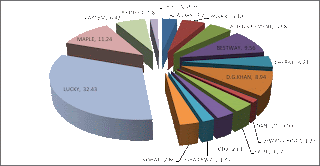In the fiscal Year 2009-2010 Lucky cement retained its largest export share in the Cement Industry with the share of 32.43% as compared to 31.98% previously. The trend of growth continues but the percentage increase has declined. It is seconded by Maple Leaf Cement which has a share of 11.24% as compared to previously 12.80% in last year. DG Khan Cement also lost its share from 14.36% to 8.94% in this year. Best way Cement, however, has been progressive with increase in export share from 8.99% previously to 9.56 % currently.
The major reason for Lucky Cement’s export share greater than local market sales in the is the location advantage which Lucky have as compared to other major industries and the professional and progressive management. Both of the Lucky Cement’s plants are located near major export zones. The Pezu plant is located in ideal location suitable for land route exports to both India and Afghanistan. Karachi Plant is suitable to export via sea route from both Port Qasim and Karachi Port Terminal. Loose cement export initiative by the company also welcomes export demand from major player throughout the world.
Lucky Cement has the largest production capacity in the industry with a total of 7.55 million metric tons. The capacity utilization for Lucky Cement’s export has been very high as compared to major Pakistani players especially for Karachi Plant. 72.81% capacity has been utilized for export as compared to 22.92% for local sales in KP. In Pezu, however, 22.65% of the capacity has been used for export as compared to 55.84% for local sales.
Maple leaf Cement has been numbered second in overall market share of exports, although its overall export share has declined from 12.80% to 11.24%. It was ranked third in the previous year. The increase in ranking is due to the drastic decline in DG Khan’s share by 5% in exports. The production capacity of Maple leaf is 3.685 million metric tons out of which 32.30% is utilized for exports.
Best Way Cement has jumped from fourth position to third position in the current year. The overall share has also increased from 8.99% to 9.56%. The major reason is due to aggressive style of expansion from the company and the acquisition of new cement plant previously named as Mustehkam Cement Co. The overall production capacity of all the three plants is 6.0723 million tons per annum out of which 16.34% has been utilized for its exports.
DG Khan Cement has a drastic decline from second position in the previous year to fourth position in the end of FY 09-10. However, its growth was very aggressive in local market with an increase of 4.3% in the local market share growth. The export share has declined from 14.36% to 8.94% in the current year. The overall production capacity is 4.220 million tons of which 23.5% was used for export and both the plant operated at an average of 118% of its total capacity.
Pak Cement is ranked at fifth position in terms of export share with an increase from 5.63% in the previous year to 6.42% currently. The production capacity is 2.047 million metric tons and the capacity utilization of 32.45% is used for its export.
We can see that all major exporters are located in the northern zone except for Lucky Cement which have its plants both in Northern and Southern zone. The major reason is that Northern zone factories are using their excess capacities to export, however southern plants have very little excess capacity because most of their production are used locally. Companies are mostly willing for local sales rather than export because of the price benefit they get in local market as compared to export market.
